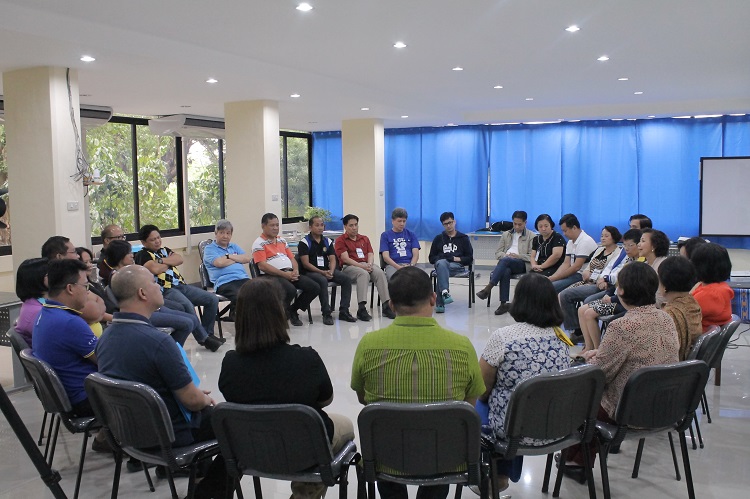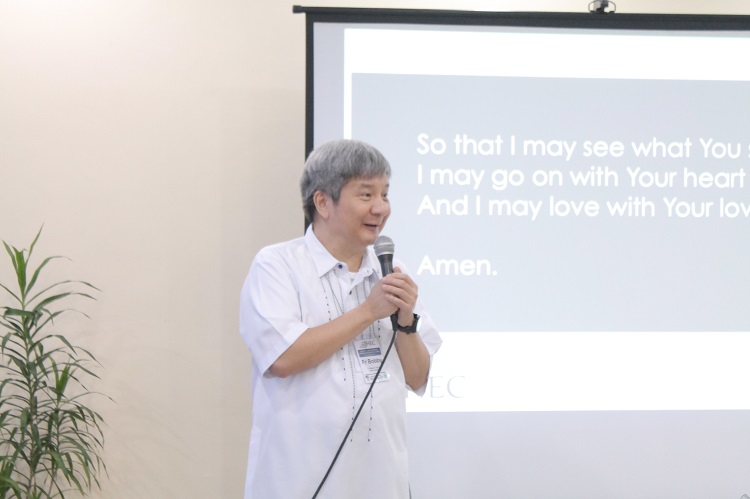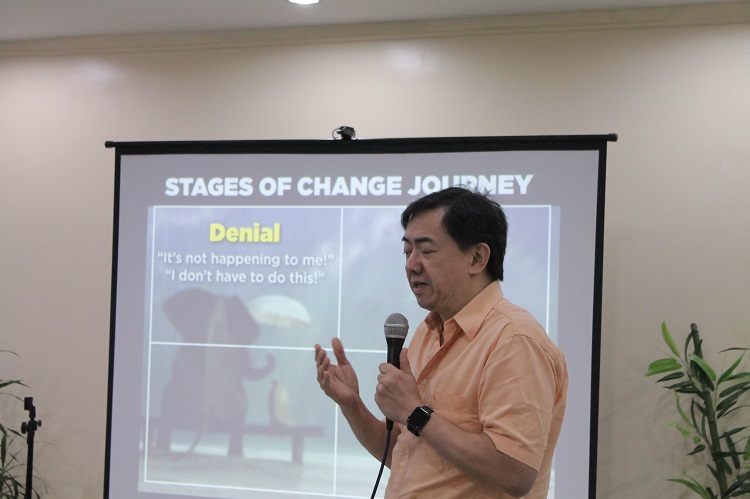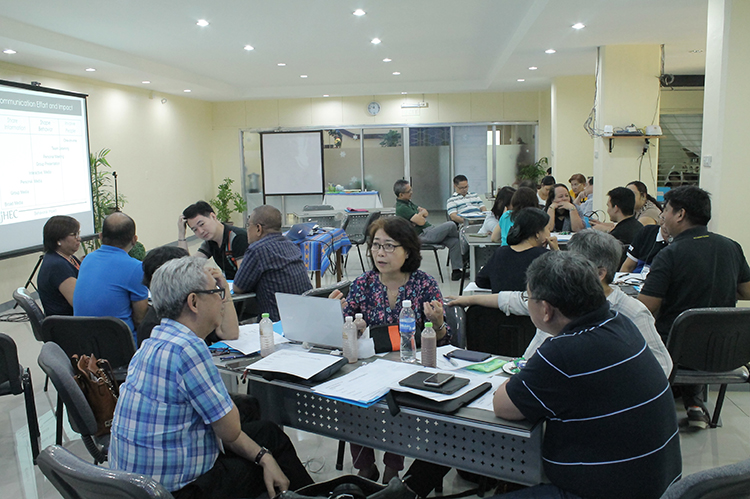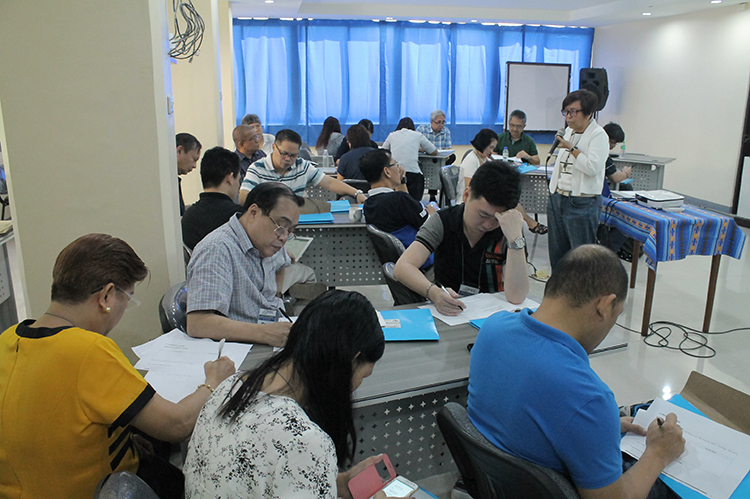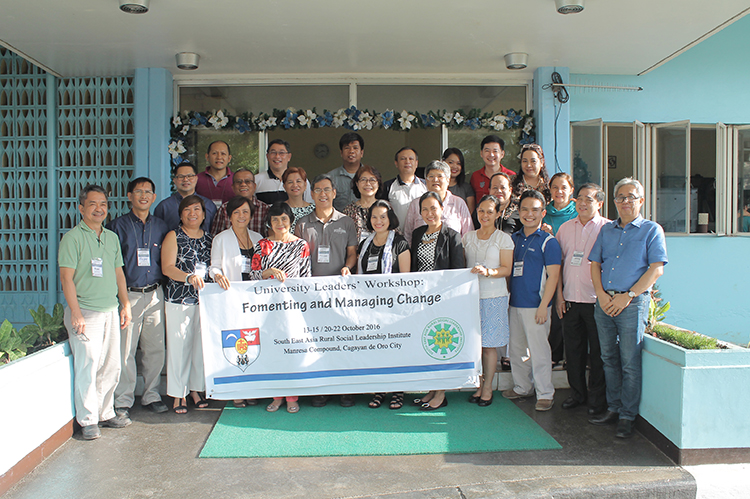MANAGING CHANGE. Top administrators of member schools of the Jesuit Higher Educational Commission gather to discuss change management. Pictured here is the first batch of school leaders from Ateneo universities and the Loyola College of Culion. Supplied photo.
The recent assembly of leaders from member schools of the Jesuit Higher Educational Commission (JHEC) in the Philippines centered on how to effectively manage the changes introduced in their respective institutions and in our country’s educational system.
In his opening message, Xavier University - Ateneo de Cagayan president Fr Roberto C Yap SJ underscored the strong social capital of Jesuit-run schools and called for exemplifying magis in fomenting change. “Magis means doing one thing with depth; not doing many things at the same time or multi-tasking,” he said.
XU serves as the host for this year’s JHEC meet, held at the Southeast Asia Rural Social Leadership Institute and participated in by top administrators of Ateneo de Davao University, Ateneo de Manila University, Ateneo de Naga University, Ateneo de Zamboanga University, Loyola College of Culion, and Xavier Ateneo.
MAGIS. In his welcome remarks during the JHEC meet, XU president Fr Roberto "Bobby" C Yap SJ calls for magis in implementing changes in school. Supplied photo.
Kurt Lewis’s The Change Process was used to guide the fomentation workshop, zeroing in on three major steps: unfreeze, change, and refreeze.
This change management program resulted to participants’ deeper understanding of the elements of organizational change, articulating the organization’s need for change, identifying resistance to change and how to address them, and designing a communication plan for change management.
The leaders of various Jesuit-run schools in the country shared on the changes their universities have undergone, why the changes were necessary, their achievements and setbacks from those changes, and what could have been done better.
Dr Edna “Bopeep” P Franco, the executive director of the Ateneo Center for Organizational Research and Development (CORD), who served as one of the facilitators during the workshop, discussed the fundamentals of an effective change management: (1) reading context, (2) introducing change, (3) developing support, (4) managing the transition, and (5) moving forward.
She highlighted the need for leaders to read the context of change and the people who will be affected by it. “There is much focus on individual characteristics of leadership and far too little focus on the situational context. Changes in the environment drive change so the leader must have the interest and capability to pay attention to context.”
RESISTANCE TO CHANGE. Workshop facilitator and former Xavier School president Fr Johnny Go SJ details the seven reasons why people in an organization resist change. Supplied photo.
Former Xavier School president Fr Johnny Go SJ, Franco’s fellow facilitator, in his sharing titled “Experiments, Errors + Examples from Xavier School San Juan (SYs 2001-2013)," he shared three changes the school underwent to improve their instruction and learning environment. These changes were: the institutional reinterpretation of Ignatian Pedagogy, their students’ interdisciplinary learning excursion in China, and the introduction and sustainability of e-learning.
From his admin experiences, Go enumerated seven reasons why people in an organization resist change: familiarity in the comfort zone, self-interests, fear of loss or dependency, need for security or fear of the unknown, bad timing, lack of trust, and personal disposition.
“As a leader, you must know how to address the resistance. It is important that when you introduce a change, there should be consultations from the ground up … a lot of talking to different groups. This is also a way to solicit their support so they become part of the process,” he said.
EFFECTING CHANGE. Top administrators of member schools of the Jesuit Higher Educational Commission gather to discuss change management. Supplied photo.
The participating leaders were challenged to look at the changes in their organizations from different perspectives, to build support from the stakeholders, and to maintain the capacity for reflection in every step of the course.
Among the major changes they discussed were the inaugural roll-out of the senior high school program as part of the K to 12 scheme, change of academic calendar (at least for AdMU), financial health of their schools, and the mandates of the Commission on Higher Education (CHED), Department of Education (DepEd), and Philippine Accrediting Association of Schools, Colleges and Universities (PAASCU).
Although many of the changes that were implemented were accepted by their respective academic communities, challenges still abound. Common among all JHEC schools are the resistance to change, financial issues, misinformation, and the lack of political will to implement the change.
For instance, the Loyola College of Culion in Palawan has lost a number of faculty members to state universities and colleges because of the disparity in compensation.
“We have teachers who transferred to public schools because the salary in the public [schools] is much higher than in private schools. One of our biggest challenges is how to retain our teachers,” said LCC president Fr Bogs Tapiador SJ.
However, Tapiador also sees this as an opportunity to assess their present human resource systems and improve them to encourage more competent faculty members to join in their college.
WORKSHOP. Top administrators of member schools of the Jesuit Higher Educational Commission gather to discuss how to manage change effectively. AdMU's Dr Antonette Angeles serves as the workshop facilitator (pictured standing). Supplied photo.
The participants agreed that there is still a lot to learn from their experiences in handling various changes in their institutions.
Among the mechanisms they want to emphasize more are: building stronger and consultative relationship with different stakeholders, encouraging wider participation of internal and external communities in social development programs, building up savings for various administrative needs, and strengthening the communication systems of their respective schools. ∎
MANAGING CHANGE. Top administrators of member schools of the Jesuit Higher Educational Commission gather to discuss change management. Pictured here is the second batch of school leaders from Ateneo universities. This JHEC leadership development competency program was divided into two batches, the first was held on October 14 and 15 while the second transpired on October 21 and 22. XU Office of Mission and Ministry serves as the secretariat for the two workshops.
